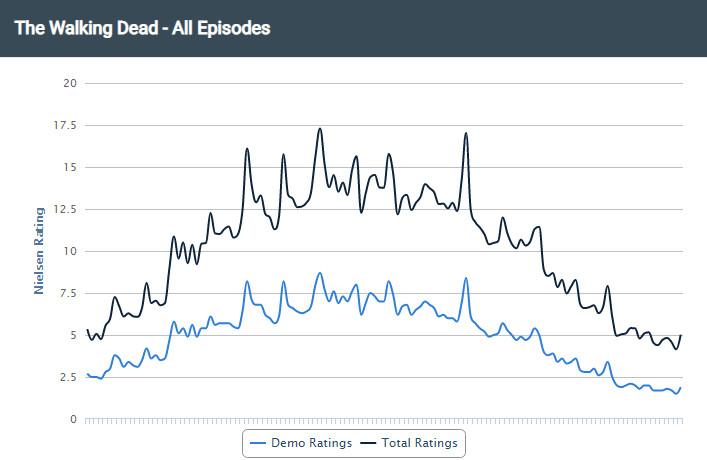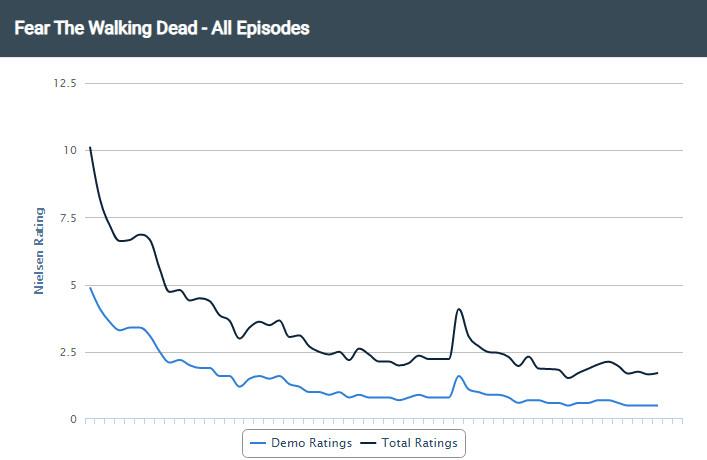There’s an understated exchange in “Humbug’s Gulch,” the third episode of Fear the Walking Dead’s currently airing fifth season, that speaks to the state of AMC’s expanding Walking Dead portfolio. John Dorie (Garret Dillahunt) and June (Jenna Elfman), the One True Pairing Fear introduced in its sweeping Season 4 reboot, are holed up in what was once a Wild West theme park, like Westworld without the robots. There they meet Dwight (Austin Amelio), a crossover character from The Walking Dead, who appeared on the flagship show’s sixth through eighth seasons. The trio bands together to dispatch an encroaching zombie horde.
“More walkers,” Dwight warns, blowing a hole in the head of one shuffling corpse.
“What’d you call ’em?” John asks.
“Walkers,” Dwight repeats. “Dead?”
The rotting antagonists that hunger for flesh look the same in both series, but they go by a different label on each show. The core characters on The Walking Dead call them “walkers.” On Fear, they’re “the dead.” But John perks up when Dwight uses the former term, because he’s heard it before: In Fear’s Season 4 premiere, Morgan, the show’s first crossover character, tells him, “Call ’em walkers where I’m from.” It’s a subtle but significant nod to fans of the franchise—a linguistic signal that the two series, which stayed separate and distinct throughout Fear’s first three seasons, are increasingly connected. It’s also an indication of how AMC envisions the future of its tentpole property: as an expanded, cross-pollinated, postapocalyptic universe, one populated by reanimated corpses instead of superheroes or Stormtroopers.
Last week, Walking Dead creator Robert Kirkman’s comic came to a cleverly camouflaged close in its 193rd issue, almost 16 years after the saga started. The surprise ending of the series that spawned the Walking Dead multimedia juggernaut followed the conclusion of the acclaimed Walking Dead video game, which ran for four seasons over seven years before wrapping up in March. With those stories resolved, AMC’s onscreen series and its lower-profile spinoff are the IP’s sole survivors. But where two Walking Dead doors close, two more open.
After Kirkman announced that the comic wouldn’t continue, AMC issued a one-sentence statement: “This extraordinary comic created a world that already lives in multiple forms, and in the hearts and minds of millions of fans around the world, and will for many years to come.”
“Multiple forms” and “for many years to come” are the key phrases there. In addition to pumping out Fear, the AMC Studios–developed aftershow Talking Dead, and the flagship show, which will enter its 10th season (and lose star Danai Gurira) this fall, AMC has ordered 10 episodes of a new, female-fronted sequel series that will premiere in 2020. The third show based on the world of Kirkman’s comics, which begins filming this month and will “focus on the first generation to come of age in the apocalypse,” will likely air during the few months a year that the original or Fear aren’t already on, ensuring that the sun never sets on AMC’s Walking Dead empire. Next year, which will mark the 10th anniversary of The Walking Dead’s first season, will also supposedly see the release of at least the first of three planned TV movies featuring Walking Dead protagonist Rick Grimes (Andrew Lincoln), who exited the series earlier this year.
AMC’s plan for Walking Dead dominance calls not just for more Walking Dead, but more tightly interwoven Walking Dead. In January, AMC executive Scott Gimple—who oversees the network’s Walking Dead universe like Marvel Studios’ Kevin Feige oversees the MCU and Lucasfilm’s Kathleen Kennedy and Michelle Rejwan oversee Star Wars—noted that “There are different sorts of crossovers we are going to do to tie the shows together, tie the universes together in certain ways that have to do with the greater happenings in the world.” He was speaking specifically about Fear, which this season has tied itself more tightly to the flagship show by integrating Dwight as a recurring character and also linked itself to the forthcoming films by introducing a character from (and dispensing some morsels of information about) the mysterious, high-tech group that kidnapped Rick in The Walking Dead’s ninth season, spiriting him away from that series.
In September, Bloomberg reported that AMC CEO Josh Sapan had briefed investors on an ambitious 10-year plan to deliver an array of Walking Dead creations in hopes of further strengthening the network’s revenues, which have doubled in the past five years. With Disney minting money via the MCU and Star Wars, every media conglomerate and network worth its subscription fees wants its own cinematic and/or televisual universe, but crafting a compelling shared world across multiple properties isn’t as simple as wanting one and willing it into existence. Universal’s planned “Dark Universe” was soon snuffed out, and the DC Extended Universe has blossomed by abandoning the blueprint for an interlinked entity. For AMC to develop a flourishing small-screen fiefdom, it will have to overcome a few significant obstacles that could derail the Dead-verse.
The TV series’ popularity is in steep decline.
Both The Walking Dead and Fear are far past their respective primes as audience draws: The former peaked in its fifth season, and Fear’s footprint has steadily declined since its debut. Each show has hit new lows in its latest season, as evidenced by the seasonal averages from the ratings database at SpoilerTV.
Seasonal Average Ratings for ‘The Walking Dead’
Seasonal Average Ratings for ‘Fear the Walking Dead’
Of course, cable cutters and a content cornucopia have shrunk ratings for most shows, and The Walking Dead remains the best-rated series in the post-Thrones cable landscape, with Fear fairly high on the leaderboard. But neither the intrigue surrounding Rick’s departure nor Fear’s reboot brought back the vanished viewers who’d had their fill of those shows, and future spinoffs can’t count on the hype that Fear benefited from when it debuted at the apex of the original’s popularity.

The comic’s conclusion could drive fans who are desperate for a fix to the TV series, but it might also lead to a general reduction in buzz about the franchise. AMC seems to be hoping that its growing assortment of Kirkman-inspired offerings, like the walkers themselves, will derive strength from numbers, but shared universes don’t necessarily work the same way as a zombie horde. Some Walking Dead diehards will watch whatever bears its branding, but others won’t make room for three or more Walking Dead series, which could cause some audience dilution and franchise fatigue if AMC doesn’t deliver something dramatically different with each new series. Speaking of which …
It’s difficult to differentiate the Dead.
Gimple and Fear’s showrunners declined to do interviews in advance of their upcoming appearances at San Diego Comic-Con, but when I spoke to them last year, they stressed the importance of setting Fear apart from The Walking Dead proper. “Leaning on what has worked in the past, I don’t think it works after nine years. You need variety,” said Gimple, who added that he wanted Fear to “occupy its own space” and provide a “different flavor.” Fear coshowrunner Andrew Chambliss cited a desire to “push the boundaries of the types of episodes we can do.”
Fear has succeeded in establishing a distinct, occasionally light-hearted tone, exchanging The Walking Dead’s twisted despots for inanimate adversaries (a massive storm, a nuclear power plant) and employing a visual inventiveness that’s sometimes lacking on its more popular counterpart; the show’s current season, which boasts its highest seasonal average IMDb user rating (for whatever that’s worth), has featured a flight on a beer-bottle-shaped hot-air balloon, mass slaughter by airplane propeller, irradiated dead, and a trick shot that took out two walkers with one bullet split by an ax head mid-flight. It tends to change locations more than its progenitor—it now takes place in an area around Austin, in contrast to the Virginia-based original show—and it’s set slightly earlier than the series it spun off from.
Even so, Fear is still similar to the series that predated it in most respects. Walkers are walkers, whether in Texas or Virginia. On both series, society is in shambles, and the survivors are doing their best to live until tomorrow and rebuild the basic trappings of civilization. The presence of Morgan and Dwight has enriched the spinoff, but it’s also made it seem somewhat like more of the same. Unlike a Star Wars or MCU installment, a Walking Dead series can’t be set thousands of years in the past, hop from planet to planet, or focus on a different set of superpowers; even if AMC were to develop an anthology show set in Kirkman’s continental U.S.—or even venture overseas—there’s probably no way to shake things up to quite the same extent that Marvel can in flitting from, say, Spider-Man to Thor to Guardians of the Galaxy. Centering the next series on a younger generation could help, although Fear’s fifth season has already introduced a self-governing group of child survivors. What’s more, the franchise that gave us Carl Grimes and Chris Manawa probably can’t be trusted not to serve up another character worthy of inclusion in our Annoying TV Kid Bracket.

Televised Dead wasn’t designed with a wider view in mind.
The concept of a shared universe isn’t embedded in the AMC series’ genes the way the walker virus is in the apocalypse survivors’ bloodstreams. Until relatively recently, both The Walking Dead and Fear tended to take close-up looks at their characters’ circumstances, eschewing bigger questions about a cure or what the planet looked like beyond the farm, prison, or ballpark where the present season was set. Now the network wants to zoom out to show the wider world. That new emphasis could keep things fresh, but it’s not the sort of story either TV series has conditioned its audience to expect, whereas Star Wars and the superhero franchises worked with epic canvases from the start.
Narratively speaking, it’s a little late to make this move. Both series have already mercifully shifted away from focusing only on day-to-day survival and obsessing over the lengths its leads will go to to protect their friends and families. (We get it, they’ve all been bad sometimes.) Instead, they’ve pivoted toward a more optimistic view of what their characters can accomplish. The Walking Dead’s familiar faces have set up a thriving, multi-settlement community, while Fear’s core characters have morphed into roving Good Samaritans in an effort to atone for past sins. After years of offering false hope before backsliding into nihilistic anomie, this was a welcome change, one that Kirkman called “a real turning point” when it occurred in the comics. AMC, then, is trying to kickstart the franchise at a time when its biggest turning point appears to have passed. Any new addition that returned to the series’ demoralizing roots would feel like a setback, but another series set in the slightly warmer and fuzzier future could come off as redundant. And many TV viewers may agree with what Kirkman wrote in his last issue: “I hate knowing what’s coming.”
In the wake of the comic’s conclusion, one more concern has surfaced: That creative tap has been turned off. After the events of Season 9, The Walking Dead is roughly three-quarters caught up to where the comics left off (on a note that seemed reminiscent of the TV series), and it may have already introduced a new community that could carry it through the rest of Kirkman’s narrative. Although Fear isn’t adapted directly from the comics and The Walking Dead has diverged dramatically from the original road map, many of the most memorable small-screen moments have stemmed from the source material.
Kirkman, who’s credited as an executive producer on both TV series, could continue to offer input in that capacity, but if he had many new stories to tell in this world, he would have continued the comic. As he explained in his farewell column: “As I worked to come up with ways to expand the story, none of it felt right. Everything felt like an unnecessary detour … it was, for lack of a better word, filler. The harder I tried to come up with new places to go, the clearer it was to me that this is what this story needed … it needed to end.”
AMC, undeterred, will walk on. As TV viewers were recently reminded, an adaptation that achieves mainstream success, presses forward when its creator can’t, and outstrips its source material may not end in fulfilling fashion for fans. And unlike Game of Thrones, The Walking Dead’s days of setting ratings records are almost certainly expired, no matter how long its denouement drags on.
